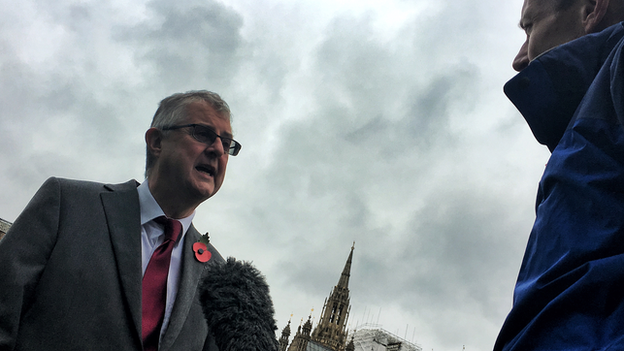'Trade-offs to come' as Brexit talks begin
- Published
- comments

Welsh Government Finance Secretary Mark Drakeford is interviewed after this morning's meeting.
The meeting lasted little more than an hour, around half as long as had been expected. Perhaps some members of the Joint Ministerial Committee (EU Negotiations), to give it its full title, had been up all night watching events on the other side of the Atlantic.
Or possibly they found they had more in common than their public stances would suggest. "We want the same things" insisted one committee member.
Not everyone sees it that way. The Scottish government's Brexit Minister, Mike Russell said afterwards: "I made it absolutely clear that membership of the Single Market and the benefits that flow from it, including free movement of labour, is essential for the economic prosperity of Scotland."
Welsh Finance Secretary Mark Drakeford told me: "Today we focused particularly on market access. and I was able to be completely clear that from the Welsh Government's point of view we know what we think we need. We need full and unfettered access to the single market without tariffs, without other barriers to trade."
'Immigration'
But can he get that without sacrificing control over immigration that is one of the UK government's "red lines"?
"There are trade-offs to come, quite certainly," he admitted. We weren't talking about justice, immigration and security issues today. That will form part of a future discussion, I'm sure, and we recognised that there will be 'read-acrosses' from all different agendas we discuss."
I put that point to Welsh Secretary, Alun Cairns, who was also at the meeting. He told me: "I don't accept that the issues are as binary as they are. We don't want to leave our sectors short of labour, that's not in the UK's national interest so we will want to come to an arrangement that works right for the UK, for all parts of the UK, but also allows us the best possible access to the single market. These are pretty fundamental and true for every part - they are as important for Scotland as they are to Wales, Northern Ireland and to England."
The meeting was chaired by [UK government] Brexit Secretary David Davis, who said that although there were "different standpoints around the table", the meeting was "constructive and amicable".
Plaid Cymru MP Jonathan Edwards welcomed the "warm words" but added: "The UK government must accept that before it can trigger Article 50, external, it must seek the approval of, not just the UK Parliament, but all of the national parliaments, including the National Assembly for Wales."
'Supreme Court'
There's little chance of the UK government agreeing to that demand, but the JMC politicians will meet again soon, although possibly not as soon as their lawyers, with the Welsh and Scottish governments seeking to intervene in the UK government's appeal to the Supreme Court over whether MPs should have a say before Britain begins formal Brexit talks.
Former Welsh Secretary Stephen Crabb has said the decision to join the legal proceedings is "entirely unnecessary and opportunistic". The Preseli Pembs Conservative MP told the House of Commons on Monday: "Rather than seek to impede or complicate what should be an orderly exit from the European Union the Welsh Labour Government should spend more time talking to their own voters about why they turned out so overwhelmingly to vote for Brexit".